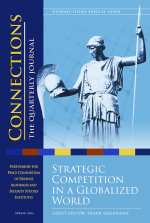Utilizing the British Broadcasting Corporation Monitoring (BBCM) service to track and analyze the use of the term “Anglo-Saxons” by Russian officials, media representatives, state policy documents, as well as wider advocates of Russia’s narrative, this article surveys how Putin’s regime references it. The term’s meanings are open-ended, dynamic, and evolving, and its applications tend to be context-sensitive. “Anglo-Saxons” functions as an epithet, trope, synonym, metaphor, and analogy in contemporary Russian discourse during Putin’s fifth term. It represents a “collective West” perceived as intent on destabilizing Russia. The supposed threat of “Anglo-Saxons” is used to justify political choices, legitimize internal order, characterize Russia’s alternative geopolitical identity, and outline its vision of a preferred global order. Following a genealogy of the term, tracing its evolving meanings through the medieval, early modern, and modern periods, the article identifies three core ways in which official discourse deploys the “Anglo-Saxon” concept: 1) “Anglo-Saxon Atlanticists” and the “collective West”; 2) the “Anglo-Saxon Reich” – portraying the “fascist Anglo-Saxons elite” and “Ordinary Nazis”; and 3) “Anglo-Saxons” as “Fifth Column” and “Foreign Agent.” Finally, the article concludes by exploring the trajectory of “Anglo-Saxon” usage and reflecting on its efficacy in legitimizing current Russian policies and strategies.
Reviewed article
The Atlanticist Anglo-Saxon Reich and All That: How Russia Understands Strategic Confrontation
Article statistics
Bibliography
“Ambassador of Russia in Canada Oleg V. Stepanov about ‘Malorossiya and a Little about the Future, February 22, 2024,” Ministry of Foreign Affairs, February 24, 2024, https://mid.ru/en/foreign_policy/news/1934361/.
“Article by Alexey Drobinin, Director, Foreign Policy Planning Department, Russia’s Foreign Ministry ‘The Vision of a Multipolar World: The Civilizational Factor and Russia’s Place in the Emerging World Order,’ the Journal ‘Russia in Global Affairs,’ February 20, 2023,” Ministry of Foreign Affairs, February 20, 2023, https://mid.ru/en/foreign_policy/news/1854841/.
“Bosnian Serb leader says Russia has right to defend its freedom,” Alternativna Televizija, Banja Luka, 9 April 2024. – in Serbian
“Director of the Institute of the USA and Canada Valery Garbuzov on the Lost Illusions of a Bygone Era,” Nezavisimaya Gazeta, August 29, 2023, https://www.ng.ru/ideas/2023-08-29/7_8812_illusions.html. – in Russian
“Foreign Minister Sergei Lavrov’s Article for Russia in Global Affairs Magazine, 5 May 2023,” Ministry of Foreign Affairs, May 5, 2023, https://mid.ru/en/foreign_policy/news/1867330/.
“Foreign Minister Sergey Lavrov’s Remarks and Answers to Questions During the Government Hour in the State Duma of the Russian Federation, Moscow, February 15, 2023,” Ministry of Foreign Affairs, February 15, 2023, https://mid.ru/en/press_service/photos/meropriyatiya_s_uchastiem_ministra/1854365/.
“Foreign Minister Sergey Lavrov’s Remarks at the 11th Moscow Conference on International Security, Moscow, August 15, 2023,” Ministry of Foreign Affairs, August 15, 2023, https://mid.ru/en/press_service/photos/meropriyatiya_s_uchastiem_ministra/1900527/.
“Kremlin Says ‘Military Operation’ in Ukraine Turned into War with West,” TASS News Agency, February 14, 2024. – in Russian
“Meeting of the Valdai International Discussion Club, October 19, 2017,” President of the Russian Federation, October 19, 2017, https://www.en.kremlin.ru/events/president/transcripts/statements/55882.
“Patrushev Warns of Risks of Biological Threats in Southern Russia,” TASS News Agency, April 27, 2022, https://tass.ru/politika/14492681. – in Russian
“Patrushev: The West Won’t Stop Its Proxy War Against Russia Even After the ‘Hot Phase’ in Ukraine,” TASS News Agency, January 29, 2024, https://tass.ru/politika/19844097. – in Russian
“Patrushev: Ukrainian Neo-Nazis Are Becoming More Active in Russia,” TASS News Agency, April 16, 2024, https://tass.ru/obschestvo/20559387. - in Russian
“Peskov Called London’s Threats to Seize Russian Property an Alarming Signal,” Interfax News Agency, Moscow, January 31, 2022, www.interfax.ru/russia/819336. – in Russian
“Putin Ally Says Russia Will Use Nuclear Weapon in Ukraine ‘If Necessary’,” Telegram messaging service, September 27, 2022. – in Russian
“Russia Blames US, UK for ‘Terrorist Attack’ on Nord Stream Pipeline,” TASS News Agency, September 27, 2023. – in Russian
“Russia’s Lavrov interviewed by Bosnian Serb TV on Ukraine, B-H, Kosovo,” Ministry of Foreign Affairs, 4 June 2022. – in Russian
“Russian Films to Focus on “Anglo-Saxon Neocolonialism,” Promoting Army: The Russian Ministry of Culture Has Identified Priority Topics for State Support for Film Production in 2023,” Ministry of Culture, November 30, 2022. – in Russian
“Russian FSB Chief Says US, UK Need Ukraine War for Financial ‘Hegemony’,” TASS News Agency, Moscow, June 1, 2023. – in Russian
“Statement by the Russian Foreign Ministry on Personal Sanctions against Representatives of Government Agencies, the IT Sector and the UK Legal Services Market,” Ministry of Foreign Affairs, April 10, 2024, https://www.mid.ru/ru/foreign_policy/news/1943473/. – in Russian
“SVR: There Were Signs That the Anglo-Saxons Blew up the Nord Streams, Then the ‘Mosaic Came Together’,” TASS News Agency, March 5, 2024, https://tass.ru/politika/20163369. – in Russian
“The Concept of the Foreign Policy of the Russian Federation,” Ministry of Foreign Affairs, March 31, 2023, https://mid.ru/en/foreign_policy/fundamental_documents/1860586/.
“US Envoy Questions Russian Use of Term ‘Anglo-Saxons’,” Vision Newspapers Online, April 29, 2023, https://visionnewspapers.com/us-envoy-questions-russian-use-of-term-anglo-saxons/.
“Zakharova Accuses NATO of Using Ukraine as an Anti-Russian Instrument,” TASS News Agency, Moscow, April 4, 2024, https://tass.ru/politika/20441313. - in Russian
Artamonova, Uliana Z., “‘Popcorn Diplomacy’: American Blockbusters and World Order,” Russia in Global Affairs 20, no. 2 (April/June 2022): 105-128, https://doi.org/10.31278/1810-6374-2022-20-2-105-128.
Bezsonov, Daniil, “Ukraine Is the Tip of the Spear in the Hands of the Anglo-Saxons,” For the Glory of the Motherland (Belarusian Military Newspaper), December 7, 2023, https://vsr.mil.by/rubrics/est_mnenie/daniil_bezsonov_ukraina_nakonechnik_kopya_v_rukakh_anglosaksov/.
Colla, Marcus, “Book Review: Hitler’s Anglo-Saxon Envy,” The Lowy Institute, September 13, 2019, https://www.lowyinstitute.org/the-interpreter/book-review-hitler-s-anglo-saxon-envy.
Drobinin, Alexey, “The Vision of a Multipolar World: The Civilizational Factor and Russia’s Place in the Emerging World Order,” Russia in Global Affairs, Opinions, February 20, 2023, https://eng.globalaffairs.ru/articles/the-vision-of-a-multipolar-world/.
Efimov, Artem, Vitaly Vasilchenko, and Ilya Lyapin, “The Collective West: What Is Putin Really Talking about When He Rails against the West?” Meduza, February 20, 2024, https://meduza.io/en/feature/2024/02/20/the-collective-west.
Egorov, Ivan, “Patrushev Accused the West of Unleashing Genocide of the Russian Population in Ukraine,” TASS News Agency, September 21, 2023, https://tass.ru/politika/18805995. – in Russian
Egorov, Ivan, “Patrushev: Russia’s Power and Potential Have Always Irritated the West,” Rossiyskaya Gazeta, April 16, 2024, https://rg.ru/2024/04/16/anglosaksam-zdes-ne-rady.html.
Egorov, Ivan, “Patrushev: The Goal of the Anglo-Saxons Is to Destroy the Russian World, to Dismember the Country and Exterminate the Peoples Inhabiting Russia,” Rossiskaya Gazeta, November 30, 2023, https://rg.ru/2023/11/30/patrushev-cel-anglosaksov-unichtozhit-russkij-mir-raschlenit-stranu-i-istrebit-narody-naseliaiushchie-rossiiu.html. – in Russian
Egorov, Ivan, “Patrushev: The West Has Created an Empire of Lies That Presupposes the Destruction of Russia,” Rossiyskaya Gazeta, April 26, 2022, https://rg.ru/2022/04/26/patrushev-zapad-sozdal-imperiiu-lzhi-predpolagaiushchuiu-unichtozhenie-rossii.html. – in Russian
Garbuzov, Valery, “Valery Garbuzov. Continuation. A Sudden Storm Out of Nowhere,” Nezavisimaya Gazeta, September 5, 2023, https://www.ng.ru/ideas/2023-09-05/100_2309051230.html.
Gasyuk, Аleksandr, “Russophiles and Multipolar Fighters from All Over the World Gathered in Moscow,” Rossiyskaya Gazeta, February 26, 2024, https://rg.ru/2024/02/26/rusofily-i-borcy-za-mnogopoliarnost-so-vsego-mira-sobralis-v-moskve.html. – in Russian
Horvath, Robert, “The Reinvention of ‘Traditional Values’: Nataliya Narochnitskaya and Russia’s Assault on Universal Human Rights,” Europe-Asia Studies 68, no. 5 (2016): 868-892, https://doi.org/10.1080/09668136.2016.1184230.
Hsu, Ruta, “Ukraine War Two Years on – Graffiti Left by Russian Soldiers Has a Dark and Sobering Message,” The Big Issue, February 23, 2024, https://www.bigissue.com/news/ukraine-war-two-years-russia-soldiers-graffiti/.
Kobrinsky, Alexander, “Kazakhstan May Lose Sovereignty: The West Has Wedged into Relations Between Moscow and Nur-Sultan,” Nezavisimaya Gazeta, July 10, 2022, https://www.ng.ru/vision/2022-07-10/5_8482_vision.html.
Kolesnikov, Andrei, “Blood and Iron: How Nationalist Imperialism Became Russia’s State Ideology,” Carnegie Russia Eurasia Center, December 6, 2023, https://carnegieendowment.org/research/2023/11/blood-and-iron-how-nationalist-imperialism-became-russias-state-ideology.
Konkov, Alexander E., “Rules for a Game without Rules: In Search of a Foreign-Policy Breakthrough,” Russia in Global Affairs 21, no. 3 (July/September 2023): 114-126, https://eng.globalaffairs.ru/articles/rules-for-a-game-without-rules/.
Laruelle, Marlène, “Russia’s Ideological Construction in the Context of the War in Ukraine,” IFRI Studies: Russie.Eurasie.Reports, no. 46 (Paris: IFRI, March 2024), https://www.ifri.org/en/studies/russias-ideological-construction-context-war-ukraine.
Lavrov, Sergei V., “Genuine Multilateralism and Diplomacy vs the ‘Rules-Based Order’,” Russia in Global Affairs 21, no. 3 (July/September 2003): 104-113, https://doi.org/10.31278/1810-6374-2023-21-3-104-113.
Mackay, Duncan, “Chernyshenko Blames Anglo-Saxon Countries for Russia’s International Sports Isolation,” Inside the Games, March 1, 2023, https://www.insidethegames.biz/articles/1134298/chernyshenko-anglo-saxon-conspiracy.
Medvedev, Dmitry, “Our People, Our Land, Our Truth,” Rossiyskaya Gazeta, December 26, 2022, https://cdnstatic.rg.ru/uploads/attachments/2022/12/25/rg012612_a14.pdf. – in Russian
Mukovozchik, Andrey, “After the Terrorist Attack in the Suburbs of Moscow, Feelings Are Overwhelming. But They Must Be Followed by Thoughts,” Belarus Today, March 24, 2024, https://www.sb.by/articles/ne-dopustit.html. – in Russian
Mukovozchik, Andrey, “The Anglo-Saxons Only Hide Behind Diplomacy and Democracy. While in Fact They Are Carrying Out Intervention,” Belarus Segodnya, June 10, 2022, https://www.sb.by/articles/kak-v-prorubi.html. – in Russian
Naryshkin, Sergey, “The Reunification of Crimea with Russia Is the Biggest Event in Modern History,” Izvestiya, March 17, 2016, https://iz.ru/news/606649. – in Russian; English translation at http://duma.gov.ru/news/11941/.
Nekrasov, Vyacheslav, “Expert: Afghanistan Is Being Used to Create a Hotbed of Tension in Central Asia,” Sputnik: Tajik Service, February 20, 2024, https://tj.sputniknews.ru/20240220/afghanistan-ochag-napryazhennost-central-asia-1061779780.html.
Nikolayev, Viktor, interview with Andrei Grozin, head of the department for Central Asia and Kazakhstan of the Institute of CIS Countries headlined: “Controlled chaos of Karakalpakstan”: “Protests in Uzbekistan Were Organized by a ‘Third Force’: Controlled Chaos of Karakalpakstan,” Moskovsky Komsomolets, July 4, 2022, www.mk.ru/politics/2022/07/04/protesty-v-uzbekistane-organizovala-tretya-sila.html.
Nurgozhaev, Marat, “The Tail Bites the Dog: Has Kyiv’s Terrorist Regime Begun to Worry Its Western Masters?” Rhythm of Eurasia, April 9, 2024, https://www.ritmeurasia.ru/news--2024-04-09--hvost-kusaet-sobaku-terroristicheskij-rezhim-kieva-nachal-bespokoit-zapadnyh-hozjaev-72627.
Pankin, Ivan, and Victor Matrosov, “Maria Zakharova on Radio KP: The Anglo-Saxons Want to Create Instability Along the Entire Perimeter of Russia. The Protests in Georgia are a Prime Example of This,” Radio Komsomolskaya Pravda, 15 March 2023.
Pastukhov, Vladimir, “Operation ‘Russian Chromosome.’ What to Do after It,” Novaya Gazeta, March 23, 2022, https://novayagazeta.ru/articles/2022/03/23/vladimir-pastukhov-operatsiia-russkaia-khromosoma. – in Russian
Pertsev, Andrey, “Putin, the anti-colonialist. The Kremlin’s new model of Russian ‘soft power’ will fuel anti-Western resentment in Southern Europe, South America, Africa, and Asia,” Meduza, November 11, 2022, https://meduza.io/en/feature/2022/11/11/putin-the-anti-colonialist.
Pertsev, Andrey, “Russia’s Public Outing,” Riddle Russia, October 22, 2022, https://ridl.io/russia-s-public-outing/.
Reitz, Mimi, “Weaponised ‘Russophobia’,” Riddle Russia, August 9, 2023, https://ridl.io/weaponised-russophobia.
Roberts, Geoffrey, “Review of Brendan Simms, Hitler: Only the World Was Enough (Allen Lane, 2019),” History Ireland 28, no. 2 (March/April 2020), https://historyireland.com/hitler-only-the-world-was-enough/.
Safonov, Andrey, “Crocus: Almost a Day Later. 10 Brief Conclusions,” Facebook, March 23, 2024, https://www.facebook.com/permalink.php?story_fbid=pfbid0BwWdffbcSf8QTyzf518J5cjxtQDr4vos9QujFJnPR6Qx9vfgzPXgoPZteBh5kK6Rl&id=100006431271563&_rdr. – in Russian
Shchipkov, Alexander, “Aggression Against Russia’s Intellect: Around the Special Operation in Ukraine There Is a Struggle Between Short-term Lies and Long-term Truth,” Nezavisimaya Gazeta, May 30, 2022, https://www.ng.ru/kartblansh/2022-05-30/3_8448_kb.html.
Slutsky, Leonid, “The Ideology of the Liberal Democratic Party of the 21st Century Is Anti-fascism,” Rossiyskaya Gazeta, June 21, 2023, https://rg.ru/2023/06/21/ideologiia-ldpr-xxi-veka-antifashizm.html.
Suslov, Mikhail, “Isolationism, a Broad Eurasian Partnership, and a Left Tinge,” Russia.Post, April 20, 2023, https://russiapost.info/politics/isolationism.
Timofeev, Ivan N., “A State as Civilisation and Political Theory,” Russia in Global Affairs, Valdai Papers, May 23, 2023, https://eng.globalaffairs.ru/articles/a-state-as-civilisation/.
Tseplyaev, Vitaly, “‘Bloody History.’ Nikolai Patrushev Explained What NATO Has Come to in 75 Years,” Argumenty i Fakty, April 1, 2024, https://aif.ru/politics/world/-krovavaya-istoriya-nikolay-patrushev-obyasnil-k-chemu-nato-prishlo-za-75-let.– in Russian
V.G., “Brainwashing in University Lecture Halls: V.G. Discusses How Indoctrination Is Destroying Russia’s Higher Education,” Riddle, November 7, 2022, https://ridl.io/brainwashing-in-university-lecture-halls/.
Verlin, Yevgeniy, “Cramped, but Not So Much. Or Not Even at All. Most Political Analysts Regarded the Conclusion about the Alliance between Moscow and Beijing as at Least Premature,” Republic: Heartland, December 16, 2021, https://republic.ru/posts/102639. – in Russian

